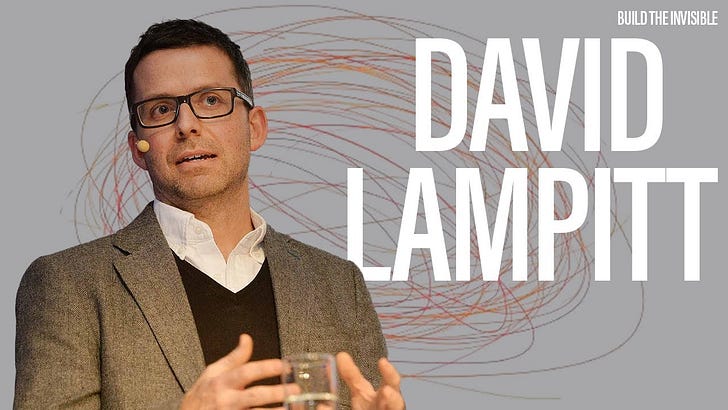Lessons from David Lampitt, CEO, Tennis Data Innovations
I sat down with David to talk about his journey so far. We discussed creating your own luck, being 'humbitious' and what we can learn from our setbacks.
David has worked in high-profile executive positions across a raft of sports including Head of Financial Regulation at the English Football Association, Chief Executive of then Premier League club Portsmouth, Chief Executive of Supporters Direct, Managing Director of SportRadar and is currently CEO of Tennis Data Innovations.
📖 Read the full transcript on danielgeey.com
📺 Watch our full interview here:
🎧 Listen to the interview here:
⭐ Creating your own luck
I’m a great believer in the fact that you do make your own luck. Over time, you make your own luck.
David shared his philosophy on how managing multiple opportunity frameworks increases your propensity for luck:
…hard work and the kind of things that you do that people don't see, never think that nobody notices it … it doesn't mean that you will get every opportunity, of course it doesn't … but it does mean that you're always increasing the likelihood, you're always increasing your probabilities of the opportunity coming your way …
I want to increase the chances that those great things come my way and they don't get handed to you on a plate; people have that misconception, but they don't, you have to seek them out or you have to put some of these structures in place, some of them may be conscious, some of them even unconscious, that help you get to that point.
As a numbers man, it’s no surprise David talks about increasing the probability of opportunities coming your way, but I fully agree.
Success if often attributed to luck, when instead it’s about being proactive and being ready, because when that opportunity presents itself you need to be prepared.
As Roman philosopher Seneca famously said, ‘Luck is when preparation meets opportunity. ‘
I talk more about this in Chapter 1 of Build The Invisible: Luck and Opportunity.
🚀 Be Humbitious
The one other word that I wanted to share with you, because it's always stuck with me, well I say always, it has come to me relatively more recently … but it's a great word because it encapsulates some of those things that we've talked about, and it's a word that Riot Games uses actually. Riot is a huge global gaming publisher and they have, I don't know if they still have, but they always had these five characteristics that they look for in a Riot Games person.
One of those characteristics always stuck with me … ‘humbitious’.
It’s hard to pinpoint exactly who coined the term ‘humbitious’, but Amer Kaissi explains the word in depth in his book Humbitious: The Power of Low-Ego, High-Drive Leadership.
Kaissi rebuffs the common myth that conflates hubris with leadership, instead advocating for ‘humbitious’ leaders; those with the powerful combination of humility and ambition.
David’s philosophy echoes this:
There’s nothing wrong with being ambitious, but the ambition shouldn’t be the badge that you wear outwardly, it should be the thing that drives you inwardly.
This brings us to the ‘hum’ of ‘humbitious’.
Humility.
Humility means acknowledging your fallibility and accepting that you’re going to fail, sometimes.
Which leads us to David’s next lesson…
🚩 Failure Signposts
I asked David what signposts he looks for during recruitment processes:
… the one thing that I would probably frame in there, which I generally do now look for, when I’m looking at somebody's CV, is evidence of the fact that they've dealt with failure. I think people should be really open about that and wear it as an experience, a learning experience, rather than as something to be hidden …
I’m looking for how they're going to deal with the challenges of failing because it's going to come, and it's either going to be on a micro personal level in a project, or they're going to be involved in a bigger challenge or a bigger bit of the business which is not going to go to plan, and how do they deal with that, and how do they bounce back from it, and what character traits have they got that tell me that they're ready to take that on.
In other words, failure is inevitable but it is also an opportunity to demonstrate your grit.
It may not have been the opportunity you’d hoped for but as David said, things don’t get handed to you on a plate.
David spoke about his own challenges :
My career path has definitely had setbacks and I would say I've learned as much, if not more, from those setbacks and those more difficult times, than I have from a time when everything went smoothly, because that's when you really get tested…
In the words of my wonderful 10-year-old daughter Issie, ‘When things don’t do your way, they are not mistakes, they are learning opportunities.’
I speak about my experience of failure in Chapter 6 of Build The Invisible: The F Word.
I’d like to thank David again for his time and his valuable insight into how you can Build The Invisible.
📺 More content from me:
Look out for the next edition of the Build The Invisible Substack, where I will be sharing lessons from Bex Smith, founder and CEO of Crux Sports.
In her previous life, Bex was an international footballer who played for New Zealand. She was a World Cup and Olympic footballer captaining the New Zealand women's national football team while winning the UEFA Champions League, German League, and German Cup Winners up until her retirement in 2013.



